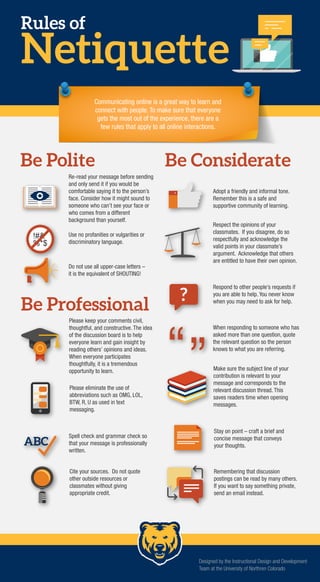Netiquette
•
0 likes•52 views
This document provides guidelines for respectful and thoughtful participation in online discussions. It recommends being polite, considerate, and professional. Users should cite sources, avoid shouting or inappropriate language, and respect others' opinions even when disagreeing. Abbreviations and unprofessional writing should be avoided. The goal is for all participants to learn from each other in a safe and supportive environment.
Report
Share
Report
Share
Download to read offline

Recommended
Recommended
More Related Content
Similar to Netiquette
Similar to Netiquette (20)
Discussion Board Grading Rubric Initial Post Criterion.docx

Discussion Board Grading Rubric Initial Post Criterion.docx
Guidelinesfor studentparticipationinonlinediscussionforums (1)

Guidelinesfor studentparticipationinonlinediscussionforums (1)
Netiquette
- 1. Remembering that discussion postings can be read by many others. If you want to say something private, send an email instead. Cite your sources. Do not quote other outside resources or classmates without giving appropriate credit. Be Polite Be Considerate Be Professional Netiquette Rules of Do not use all upper-case letters – it is the equivalent of SHOUTING! Re-read your message before sending and only send it if you would be comfortable saying it to the person’s face. Consider how it might sound to someone who can’t see your face or who comes from a different background than yourself. Use no profanities or vulgarities or discriminatory language. Please keep your comments civil, thoughtful, and constructive. The idea of the discussion board is to help everyone learn and gain insight by reading others’ opinions and ideas. When everyone participates thoughtfully, it is a tremendous opportunity to learn. Please eliminate the use of abbreviations such as OMG, LOL, BTW, R, U as used in text messaging. Spell check and grammar check so that your message is professionally written. Communicating online is a great way to learn and connect with people. To make sure that everyone gets the most out of the experience, there are a few rules that apply to all online interactions. Adopt a friendly and informal tone. Remember this is a safe and supportive community of learning. Respect the opinions of your classmates. If you disagree, do so respectfully and acknowledge the valid points in your classmate’s argument. Acknowledge that others are entitled to have their own opinion. Respond to other people’s requests if you are able to help. You never know when you may need to ask for help. When responding to someone who has asked more than one question, quote the relevant question so the person knows to what you are referring. Make sure the subject line of your contribution is relevant to your message and corresponds to the relevant discussion thread. This saves readers time when opening messages. Stay on point – craft a brief and concise message that conveys your thoughts. ? Designed by the Instructional Design and Development Team at the University of Northren Colorado
